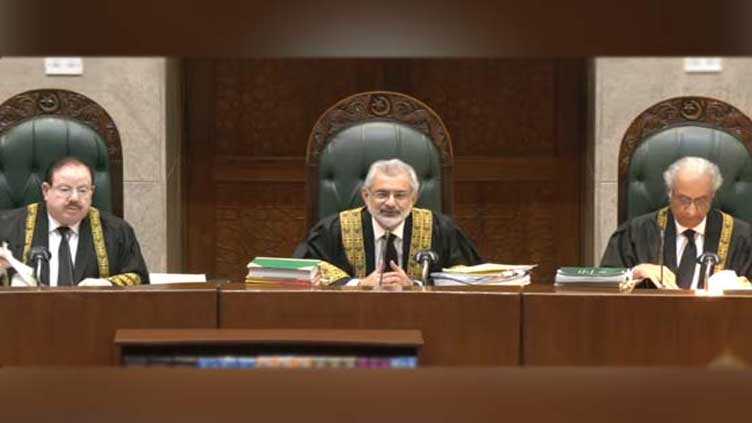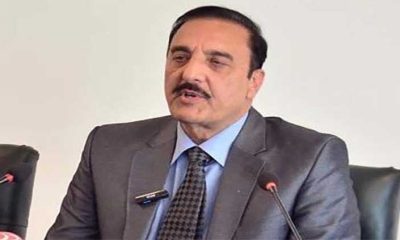A full court bench headed by Chief Justice Qazi Faez Isa is hearing the review petitions [clubbed together] against the Supreme Court (Practice and Procedure) Act, 2023 – a legislation introduced by the former coalition government.
This is the first time in country’s history that the hearing in a case is being live telecast.
In this way, the new chief justice will hear one of the most important cases currently pending with the Supreme Court on his very first working day.
Chief Justice Qazi Faiz Isa is presiding over the full court on the first court day. The 15-member full court headed by Chief Justice Qazi Faiz Isa also comprised Justice Sardar Tariq Masood, Justice Ijazul Ahsan, Justice Mansoor Ali Shah, Justice Muneeb Akhtar, Justice Yahya Afridi, Justice Aminuddin Khan, Justice Mazahir Ali Akbar Naqvi, Justice Jamal Khan Mandokhel, Justice Muhammad Ali Mazhar, Justice Ayesha Malik, Justice Athar Minallah, Justice Hasan Azhar Rizvi, Justice Shahid Waheed and Justice Musarrat Hilali.
Earlier, the Supreme Court approved the petitions to constitute a full court on appeals against the SC Practice and Procedure Act in the Supreme Court.
The federal government requested the apex court to reject petitions against the Supreme Court Practice and Procedure Act. The federal government, taking a stand, requested that the petitions against the Act of the Parliament were inadmissible, so theses should be dismissed.
The federal government submitted its written response in the case through the attorney general, in which the federal government requested to reject petitions against the Act.
According to government reply, Parliament was empowered to legislate under Article 191 of the Constitution and Article 191 did not prevent Parliament from making laws.
It was stated in the reply that the independence of the judiciary was not affected by the said Act and no power had been withdrawn from the Supreme Court under the Act. It further said that petitions against the Parliament Act were inadmissible even on merit.
As the hearing started, Khawaja Tariq Rahim started presenting arguments. Justice Ayesha Malik remarked that the right to appeal had been given in Section 5 of the Act in question.
“If we decide the case on the full court and declare the law correct, how the appeal would be made against it?, she asked.
The Chief Justice remarked that 57,000 cases of the people were awaiting justice.
Justice Jamal Khan Mandokhel remarked that Khawaja Rahim should read Article 191. Kh Rahim said the power to regulate the court belongs to the Supreme Court under the Federal Legislative List Schedule.
The Chief Justice said that the Supreme Court had its own authority to regulate its powers. “Are you saying that 1989 rules are in conflict with the Constitution?, The CJP asked to the counsel.
Khawaja Rahim said the rules of 1980 were framed by the full court and those rules were correct. The chief justice remarked that he should not talk about the future and limit his arguments to the present.
The CJP said if the legislation was enacted in the future, he could challenge it again. Justice Muneeb Akhtar questioned that allowing the thee-member committee to have the power of clause 3 of Article 184, was a judicial power or an administrative one.
Justice Muneeb raised the question that if there was administrative authority, had the parliament abolished judicial authority?
Justice Musarat Hilali asked if the powers of the chief justice had been clipped by this legislation.
Justice Mandokhel inquired whether the powers of the chief justice had been withdrawn and the powers of the Supreme Court had been curbed.
Justice Athar Minallah asked Khawaja Rahim if agreed that chief justice was master of the roster.
Khawaja Rahim argued that he was saying that this power could not be used by Parliament.
Justice Akhtar said don’t he think that powers of the CJP could be regulated only through constitutional amendment? Justice Shah said, “Do you mean to say that 17 judges can regulate the powers of the full court but Parliament cannot?” Khawaja Rahim replied he did not mean that.
Khawaja Rahim said a constitutional amendment was needed to grant right of appeal and the Practice and Procedure Act was unconstitutional.
It should be remembered that the eight-member bench of the Supreme Court had stopped implementation of the Practice and Procedure Act on April 13.
The Supreme Court Practice and Procedure Act deals with distribution of powers of the Chief Justice in cases of public interest. According to the Act, the decision to take suo motu notice will be taken by the chief justice and a committee consisting of two senior judges.
The Supreme Court (Practice and Procedure) Act, 2023 has curbed the chief justice’s powers to take suo motu in individual capacity and vested the same to a three-member committee comprising the chief justice and the next two most senior judges.
Moreover, the legislation also says that the three-member committee would also responsible for constituting benches to handle cases with the majority vote being the mode of making a decision in case there is a disagreement.
Last month, Justice Mansoor Ali Shah suggested that the chief justice should halt proceedings of cases instituted under Article 184(3) of the Constitution, until a final decision on the fate of the Supreme Court (Practice and Procedure) Act, 2023.
His remarks were part of the two-page note he issued during the hearing of a petition filed by the PTI chairman challenging the amendments in the NAB laws.
However, the three-member bench headed by the then chief moved ahead and later struck down the changes introduced by the coalition government by accepting the petition.
But Justice Shah wrote a scathing dissenting note in which he advocated the parliament’s supremacy and its powers to make or unmake laws.
Post Views: 85


 Sports3 months ago
Sports3 months ago
 Sports3 months ago
Sports3 months ago
 Fashion3 months ago
Fashion3 months ago
 World3 months ago
World3 months ago
 pakistan3 months ago
pakistan3 months ago
 pakistan3 months ago
pakistan3 months ago
 World3 months ago
World3 months ago
 Sports2 months ago
Sports2 months ago






















